Geely's Acquisition of Volvo: Strategy, Success, and Challenges Report
VerifiedAdded on 2022/11/26
|9
|2523
|270
Report
AI Summary
This report provides an in-depth analysis of Geely's acquisition of Volvo, a significant event in global business strategy. It begins with an introduction to mergers and acquisitions, highlighting their benefits and potential challenges, particularly in the context of emerging market firms acquiring established Western companies. The report then details the background of Geely's acquisition of Volvo, including the financial aspects of the deal. A substantial portion of the report is dedicated to analyzing the success of the strategy, examining how Volvo's technology, research and development capabilities, financial strength, brand recognition, and supply chain efficiency have benefited Geely. The report also addresses the challenges associated with the acquisition, such as cultural differences and management dissimilarities. It concludes with recommendations for future strategies, emphasizing the importance of adapting to the changing global business environment and understanding stakeholder needs. The report references relevant literature and provides a comprehensive overview of the strategic implications and outcomes of the Geely-Volvo acquisition.
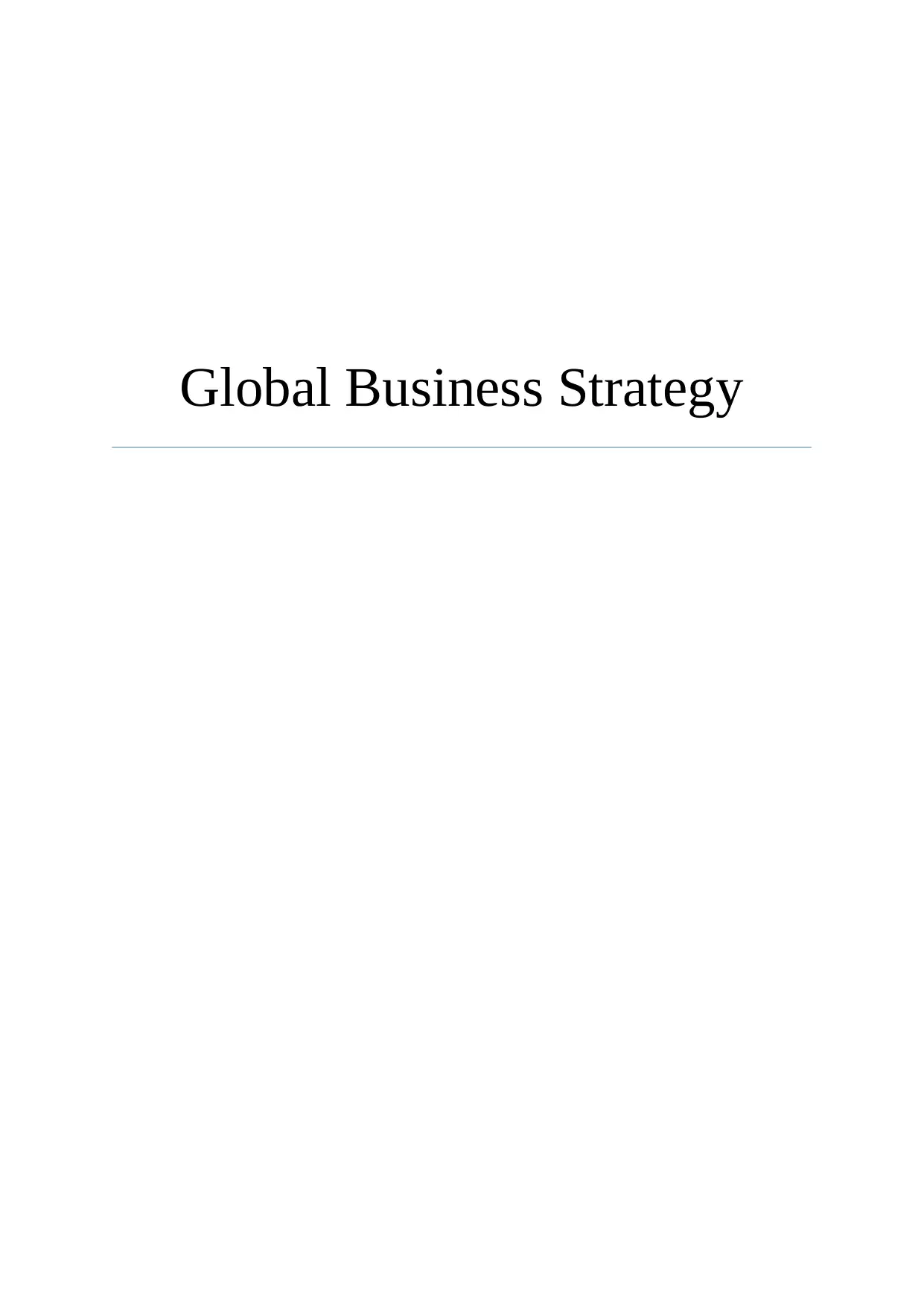
Global Business Strategy
Paraphrase This Document
Need a fresh take? Get an instant paraphrase of this document with our AI Paraphraser

1
Contents
Introduction...........................................................................................................................................1
Background of the Acquisition process.................................................................................................1
Success of the strategy...........................................................................................................................1
Challenges in acquisition.......................................................................................................................4
Recommendation for future...................................................................................................................4
Conclusion.............................................................................................................................................4
REFERENCES......................................................................................................................................6
Contents
Introduction...........................................................................................................................................1
Background of the Acquisition process.................................................................................................1
Success of the strategy...........................................................................................................................1
Challenges in acquisition.......................................................................................................................4
Recommendation for future...................................................................................................................4
Conclusion.............................................................................................................................................4
REFERENCES......................................................................................................................................6
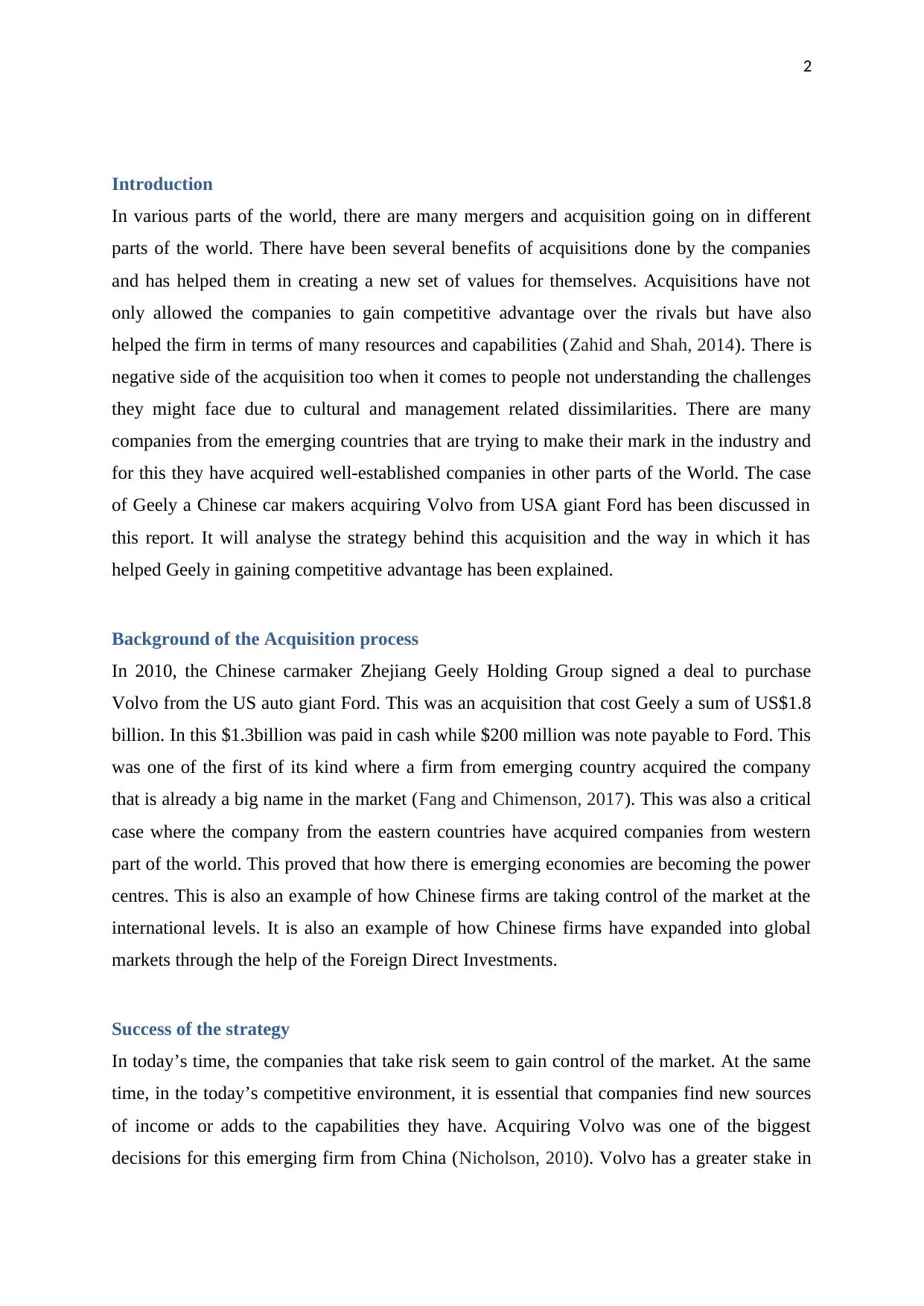
2
Introduction
In various parts of the world, there are many mergers and acquisition going on in different
parts of the world. There have been several benefits of acquisitions done by the companies
and has helped them in creating a new set of values for themselves. Acquisitions have not
only allowed the companies to gain competitive advantage over the rivals but have also
helped the firm in terms of many resources and capabilities (Zahid and Shah, 2014). There is
negative side of the acquisition too when it comes to people not understanding the challenges
they might face due to cultural and management related dissimilarities. There are many
companies from the emerging countries that are trying to make their mark in the industry and
for this they have acquired well-established companies in other parts of the World. The case
of Geely a Chinese car makers acquiring Volvo from USA giant Ford has been discussed in
this report. It will analyse the strategy behind this acquisition and the way in which it has
helped Geely in gaining competitive advantage has been explained.
Background of the Acquisition process
In 2010, the Chinese carmaker Zhejiang Geely Holding Group signed a deal to purchase
Volvo from the US auto giant Ford. This was an acquisition that cost Geely a sum of US$1.8
billion. In this $1.3billion was paid in cash while $200 million was note payable to Ford. This
was one of the first of its kind where a firm from emerging country acquired the company
that is already a big name in the market (Fang and Chimenson, 2017). This was also a critical
case where the company from the eastern countries have acquired companies from western
part of the world. This proved that how there is emerging economies are becoming the power
centres. This is also an example of how Chinese firms are taking control of the market at the
international levels. It is also an example of how Chinese firms have expanded into global
markets through the help of the Foreign Direct Investments.
Success of the strategy
In today’s time, the companies that take risk seem to gain control of the market. At the same
time, in the today’s competitive environment, it is essential that companies find new sources
of income or adds to the capabilities they have. Acquiring Volvo was one of the biggest
decisions for this emerging firm from China (Nicholson, 2010). Volvo has a greater stake in
Introduction
In various parts of the world, there are many mergers and acquisition going on in different
parts of the world. There have been several benefits of acquisitions done by the companies
and has helped them in creating a new set of values for themselves. Acquisitions have not
only allowed the companies to gain competitive advantage over the rivals but have also
helped the firm in terms of many resources and capabilities (Zahid and Shah, 2014). There is
negative side of the acquisition too when it comes to people not understanding the challenges
they might face due to cultural and management related dissimilarities. There are many
companies from the emerging countries that are trying to make their mark in the industry and
for this they have acquired well-established companies in other parts of the World. The case
of Geely a Chinese car makers acquiring Volvo from USA giant Ford has been discussed in
this report. It will analyse the strategy behind this acquisition and the way in which it has
helped Geely in gaining competitive advantage has been explained.
Background of the Acquisition process
In 2010, the Chinese carmaker Zhejiang Geely Holding Group signed a deal to purchase
Volvo from the US auto giant Ford. This was an acquisition that cost Geely a sum of US$1.8
billion. In this $1.3billion was paid in cash while $200 million was note payable to Ford. This
was one of the first of its kind where a firm from emerging country acquired the company
that is already a big name in the market (Fang and Chimenson, 2017). This was also a critical
case where the company from the eastern countries have acquired companies from western
part of the world. This proved that how there is emerging economies are becoming the power
centres. This is also an example of how Chinese firms are taking control of the market at the
international levels. It is also an example of how Chinese firms have expanded into global
markets through the help of the Foreign Direct Investments.
Success of the strategy
In today’s time, the companies that take risk seem to gain control of the market. At the same
time, in the today’s competitive environment, it is essential that companies find new sources
of income or adds to the capabilities they have. Acquiring Volvo was one of the biggest
decisions for this emerging firm from China (Nicholson, 2010). Volvo has a greater stake in
⊘ This is a preview!⊘
Do you want full access?
Subscribe today to unlock all pages.

Trusted by 1+ million students worldwide
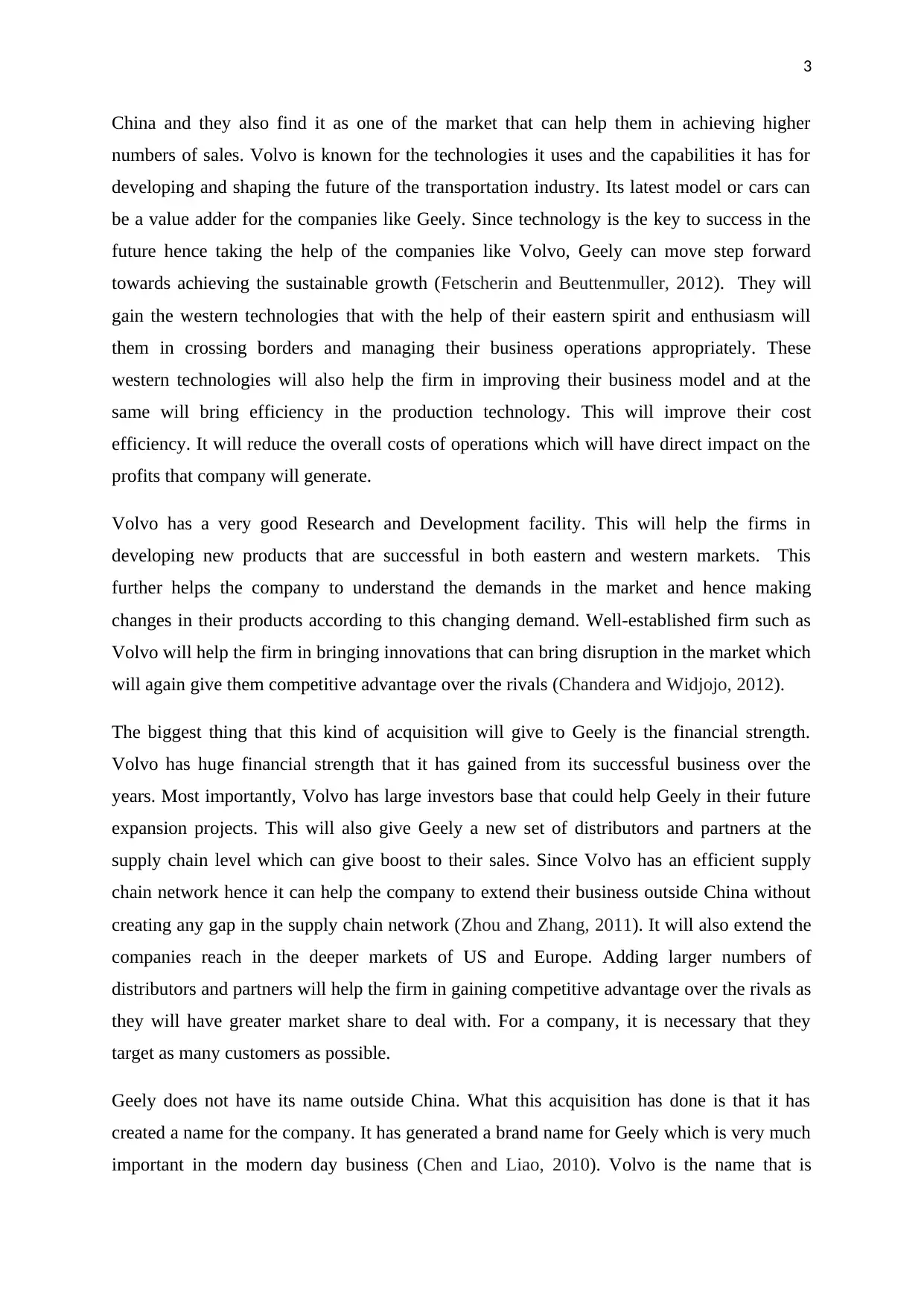
3
China and they also find it as one of the market that can help them in achieving higher
numbers of sales. Volvo is known for the technologies it uses and the capabilities it has for
developing and shaping the future of the transportation industry. Its latest model or cars can
be a value adder for the companies like Geely. Since technology is the key to success in the
future hence taking the help of the companies like Volvo, Geely can move step forward
towards achieving the sustainable growth (Fetscherin and Beuttenmuller, 2012). They will
gain the western technologies that with the help of their eastern spirit and enthusiasm will
them in crossing borders and managing their business operations appropriately. These
western technologies will also help the firm in improving their business model and at the
same will bring efficiency in the production technology. This will improve their cost
efficiency. It will reduce the overall costs of operations which will have direct impact on the
profits that company will generate.
Volvo has a very good Research and Development facility. This will help the firms in
developing new products that are successful in both eastern and western markets. This
further helps the company to understand the demands in the market and hence making
changes in their products according to this changing demand. Well-established firm such as
Volvo will help the firm in bringing innovations that can bring disruption in the market which
will again give them competitive advantage over the rivals (Chandera and Widjojo, 2012).
The biggest thing that this kind of acquisition will give to Geely is the financial strength.
Volvo has huge financial strength that it has gained from its successful business over the
years. Most importantly, Volvo has large investors base that could help Geely in their future
expansion projects. This will also give Geely a new set of distributors and partners at the
supply chain level which can give boost to their sales. Since Volvo has an efficient supply
chain network hence it can help the company to extend their business outside China without
creating any gap in the supply chain network (Zhou and Zhang, 2011). It will also extend the
companies reach in the deeper markets of US and Europe. Adding larger numbers of
distributors and partners will help the firm in gaining competitive advantage over the rivals as
they will have greater market share to deal with. For a company, it is necessary that they
target as many customers as possible.
Geely does not have its name outside China. What this acquisition has done is that it has
created a name for the company. It has generated a brand name for Geely which is very much
important in the modern day business (Chen and Liao, 2010). Volvo is the name that is
China and they also find it as one of the market that can help them in achieving higher
numbers of sales. Volvo is known for the technologies it uses and the capabilities it has for
developing and shaping the future of the transportation industry. Its latest model or cars can
be a value adder for the companies like Geely. Since technology is the key to success in the
future hence taking the help of the companies like Volvo, Geely can move step forward
towards achieving the sustainable growth (Fetscherin and Beuttenmuller, 2012). They will
gain the western technologies that with the help of their eastern spirit and enthusiasm will
them in crossing borders and managing their business operations appropriately. These
western technologies will also help the firm in improving their business model and at the
same will bring efficiency in the production technology. This will improve their cost
efficiency. It will reduce the overall costs of operations which will have direct impact on the
profits that company will generate.
Volvo has a very good Research and Development facility. This will help the firms in
developing new products that are successful in both eastern and western markets. This
further helps the company to understand the demands in the market and hence making
changes in their products according to this changing demand. Well-established firm such as
Volvo will help the firm in bringing innovations that can bring disruption in the market which
will again give them competitive advantage over the rivals (Chandera and Widjojo, 2012).
The biggest thing that this kind of acquisition will give to Geely is the financial strength.
Volvo has huge financial strength that it has gained from its successful business over the
years. Most importantly, Volvo has large investors base that could help Geely in their future
expansion projects. This will also give Geely a new set of distributors and partners at the
supply chain level which can give boost to their sales. Since Volvo has an efficient supply
chain network hence it can help the company to extend their business outside China without
creating any gap in the supply chain network (Zhou and Zhang, 2011). It will also extend the
companies reach in the deeper markets of US and Europe. Adding larger numbers of
distributors and partners will help the firm in gaining competitive advantage over the rivals as
they will have greater market share to deal with. For a company, it is necessary that they
target as many customers as possible.
Geely does not have its name outside China. What this acquisition has done is that it has
created a name for the company. It has generated a brand name for Geely which is very much
important in the modern day business (Chen and Liao, 2010). Volvo is the name that is
Paraphrase This Document
Need a fresh take? Get an instant paraphrase of this document with our AI Paraphraser
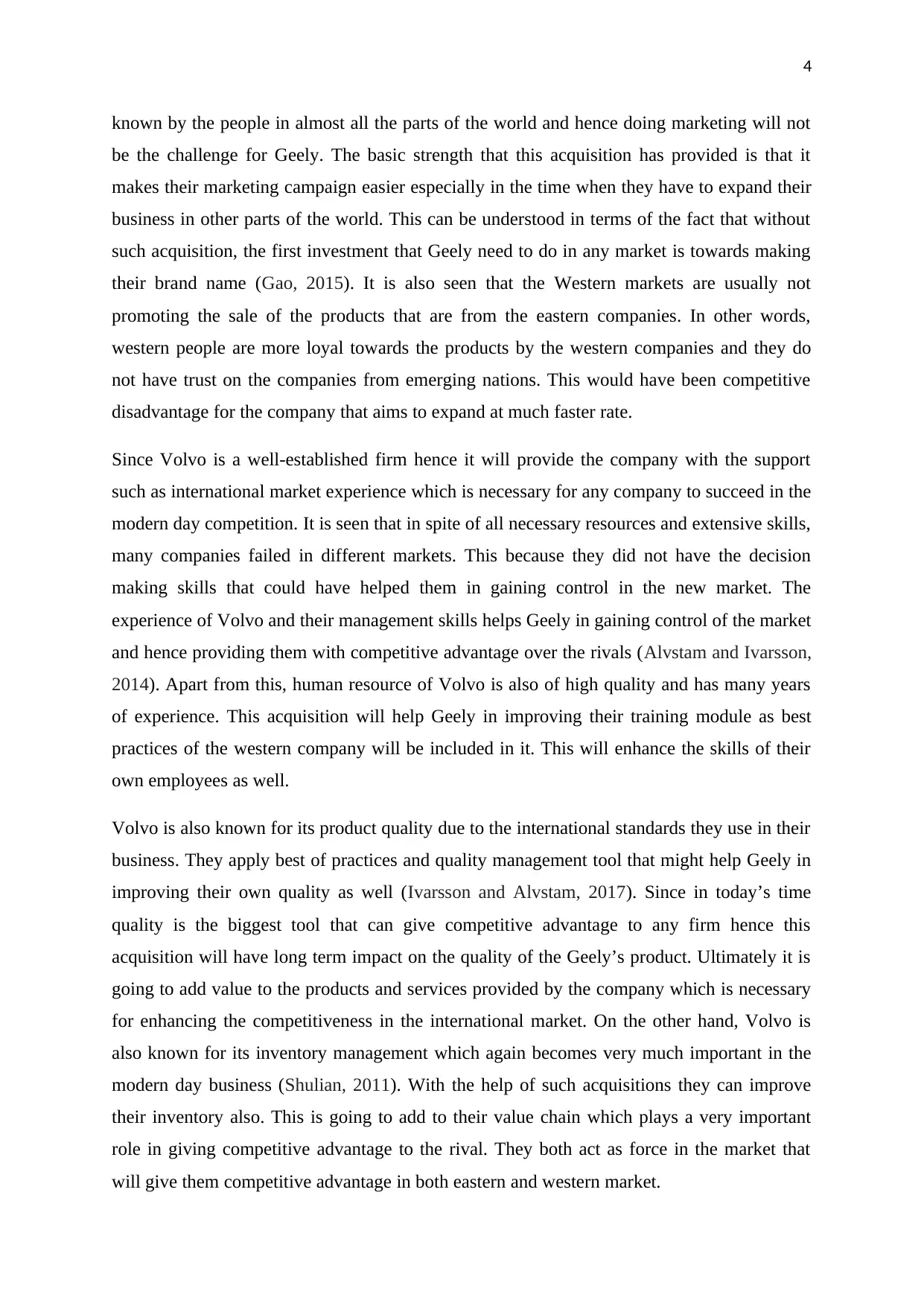
4
known by the people in almost all the parts of the world and hence doing marketing will not
be the challenge for Geely. The basic strength that this acquisition has provided is that it
makes their marketing campaign easier especially in the time when they have to expand their
business in other parts of the world. This can be understood in terms of the fact that without
such acquisition, the first investment that Geely need to do in any market is towards making
their brand name (Gao, 2015). It is also seen that the Western markets are usually not
promoting the sale of the products that are from the eastern companies. In other words,
western people are more loyal towards the products by the western companies and they do
not have trust on the companies from emerging nations. This would have been competitive
disadvantage for the company that aims to expand at much faster rate.
Since Volvo is a well-established firm hence it will provide the company with the support
such as international market experience which is necessary for any company to succeed in the
modern day competition. It is seen that in spite of all necessary resources and extensive skills,
many companies failed in different markets. This because they did not have the decision
making skills that could have helped them in gaining control in the new market. The
experience of Volvo and their management skills helps Geely in gaining control of the market
and hence providing them with competitive advantage over the rivals (Alvstam and Ivarsson,
2014). Apart from this, human resource of Volvo is also of high quality and has many years
of experience. This acquisition will help Geely in improving their training module as best
practices of the western company will be included in it. This will enhance the skills of their
own employees as well.
Volvo is also known for its product quality due to the international standards they use in their
business. They apply best of practices and quality management tool that might help Geely in
improving their own quality as well (Ivarsson and Alvstam, 2017). Since in today’s time
quality is the biggest tool that can give competitive advantage to any firm hence this
acquisition will have long term impact on the quality of the Geely’s product. Ultimately it is
going to add value to the products and services provided by the company which is necessary
for enhancing the competitiveness in the international market. On the other hand, Volvo is
also known for its inventory management which again becomes very much important in the
modern day business (Shulian, 2011). With the help of such acquisitions they can improve
their inventory also. This is going to add to their value chain which plays a very important
role in giving competitive advantage to the rival. They both act as force in the market that
will give them competitive advantage in both eastern and western market.
known by the people in almost all the parts of the world and hence doing marketing will not
be the challenge for Geely. The basic strength that this acquisition has provided is that it
makes their marketing campaign easier especially in the time when they have to expand their
business in other parts of the world. This can be understood in terms of the fact that without
such acquisition, the first investment that Geely need to do in any market is towards making
their brand name (Gao, 2015). It is also seen that the Western markets are usually not
promoting the sale of the products that are from the eastern companies. In other words,
western people are more loyal towards the products by the western companies and they do
not have trust on the companies from emerging nations. This would have been competitive
disadvantage for the company that aims to expand at much faster rate.
Since Volvo is a well-established firm hence it will provide the company with the support
such as international market experience which is necessary for any company to succeed in the
modern day competition. It is seen that in spite of all necessary resources and extensive skills,
many companies failed in different markets. This because they did not have the decision
making skills that could have helped them in gaining control in the new market. The
experience of Volvo and their management skills helps Geely in gaining control of the market
and hence providing them with competitive advantage over the rivals (Alvstam and Ivarsson,
2014). Apart from this, human resource of Volvo is also of high quality and has many years
of experience. This acquisition will help Geely in improving their training module as best
practices of the western company will be included in it. This will enhance the skills of their
own employees as well.
Volvo is also known for its product quality due to the international standards they use in their
business. They apply best of practices and quality management tool that might help Geely in
improving their own quality as well (Ivarsson and Alvstam, 2017). Since in today’s time
quality is the biggest tool that can give competitive advantage to any firm hence this
acquisition will have long term impact on the quality of the Geely’s product. Ultimately it is
going to add value to the products and services provided by the company which is necessary
for enhancing the competitiveness in the international market. On the other hand, Volvo is
also known for its inventory management which again becomes very much important in the
modern day business (Shulian, 2011). With the help of such acquisitions they can improve
their inventory also. This is going to add to their value chain which plays a very important
role in giving competitive advantage to the rival. They both act as force in the market that
will give them competitive advantage in both eastern and western market.
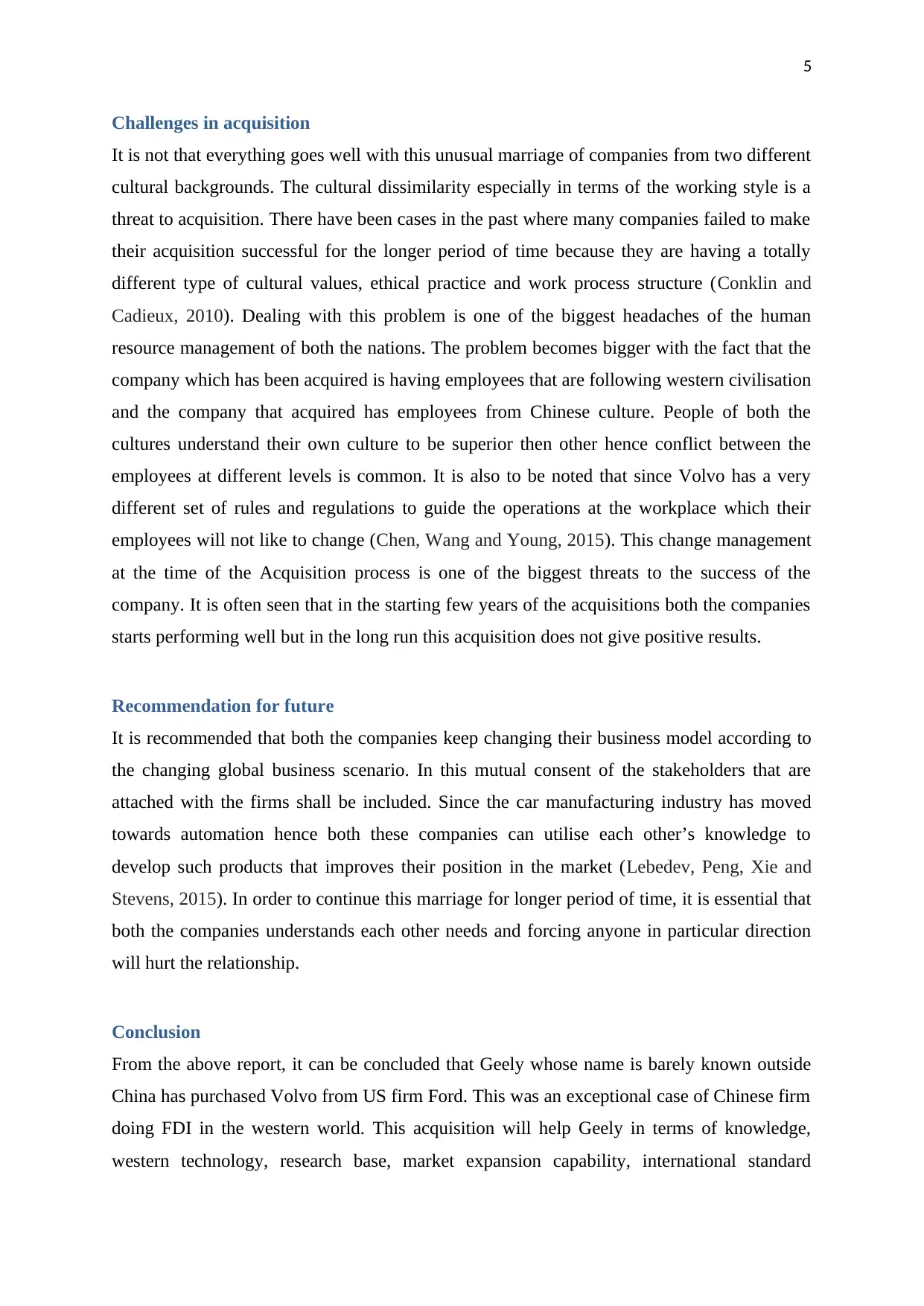
5
Challenges in acquisition
It is not that everything goes well with this unusual marriage of companies from two different
cultural backgrounds. The cultural dissimilarity especially in terms of the working style is a
threat to acquisition. There have been cases in the past where many companies failed to make
their acquisition successful for the longer period of time because they are having a totally
different type of cultural values, ethical practice and work process structure (Conklin and
Cadieux, 2010). Dealing with this problem is one of the biggest headaches of the human
resource management of both the nations. The problem becomes bigger with the fact that the
company which has been acquired is having employees that are following western civilisation
and the company that acquired has employees from Chinese culture. People of both the
cultures understand their own culture to be superior then other hence conflict between the
employees at different levels is common. It is also to be noted that since Volvo has a very
different set of rules and regulations to guide the operations at the workplace which their
employees will not like to change (Chen, Wang and Young, 2015). This change management
at the time of the Acquisition process is one of the biggest threats to the success of the
company. It is often seen that in the starting few years of the acquisitions both the companies
starts performing well but in the long run this acquisition does not give positive results.
Recommendation for future
It is recommended that both the companies keep changing their business model according to
the changing global business scenario. In this mutual consent of the stakeholders that are
attached with the firms shall be included. Since the car manufacturing industry has moved
towards automation hence both these companies can utilise each other’s knowledge to
develop such products that improves their position in the market (Lebedev, Peng, Xie and
Stevens, 2015). In order to continue this marriage for longer period of time, it is essential that
both the companies understands each other needs and forcing anyone in particular direction
will hurt the relationship.
Conclusion
From the above report, it can be concluded that Geely whose name is barely known outside
China has purchased Volvo from US firm Ford. This was an exceptional case of Chinese firm
doing FDI in the western world. This acquisition will help Geely in terms of knowledge,
western technology, research base, market expansion capability, international standard
Challenges in acquisition
It is not that everything goes well with this unusual marriage of companies from two different
cultural backgrounds. The cultural dissimilarity especially in terms of the working style is a
threat to acquisition. There have been cases in the past where many companies failed to make
their acquisition successful for the longer period of time because they are having a totally
different type of cultural values, ethical practice and work process structure (Conklin and
Cadieux, 2010). Dealing with this problem is one of the biggest headaches of the human
resource management of both the nations. The problem becomes bigger with the fact that the
company which has been acquired is having employees that are following western civilisation
and the company that acquired has employees from Chinese culture. People of both the
cultures understand their own culture to be superior then other hence conflict between the
employees at different levels is common. It is also to be noted that since Volvo has a very
different set of rules and regulations to guide the operations at the workplace which their
employees will not like to change (Chen, Wang and Young, 2015). This change management
at the time of the Acquisition process is one of the biggest threats to the success of the
company. It is often seen that in the starting few years of the acquisitions both the companies
starts performing well but in the long run this acquisition does not give positive results.
Recommendation for future
It is recommended that both the companies keep changing their business model according to
the changing global business scenario. In this mutual consent of the stakeholders that are
attached with the firms shall be included. Since the car manufacturing industry has moved
towards automation hence both these companies can utilise each other’s knowledge to
develop such products that improves their position in the market (Lebedev, Peng, Xie and
Stevens, 2015). In order to continue this marriage for longer period of time, it is essential that
both the companies understands each other needs and forcing anyone in particular direction
will hurt the relationship.
Conclusion
From the above report, it can be concluded that Geely whose name is barely known outside
China has purchased Volvo from US firm Ford. This was an exceptional case of Chinese firm
doing FDI in the western world. This acquisition will help Geely in terms of knowledge,
western technology, research base, market expansion capability, international standard
⊘ This is a preview!⊘
Do you want full access?
Subscribe today to unlock all pages.

Trusted by 1+ million students worldwide

6
practices, improvement in their overall value chain, improving brand image outside China,
innovation and many other things. This is because Volvo is well established firm with huge
capabilities. Geely needs to manage the cultural dissimilarity so as to maintain the
relationship for the long term.
practices, improvement in their overall value chain, improving brand image outside China,
innovation and many other things. This is because Volvo is well established firm with huge
capabilities. Geely needs to manage the cultural dissimilarity so as to maintain the
relationship for the long term.
Paraphrase This Document
Need a fresh take? Get an instant paraphrase of this document with our AI Paraphraser
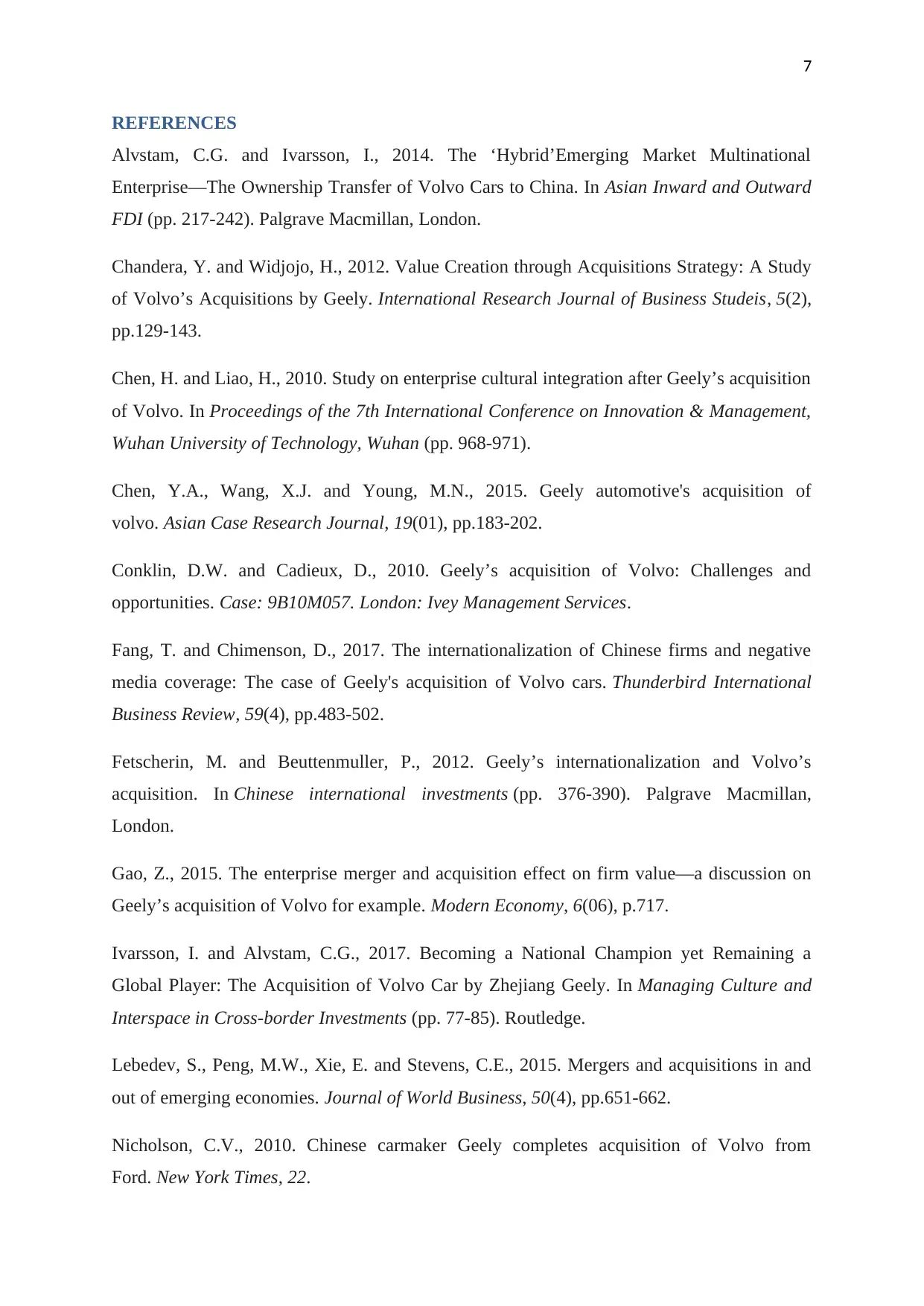
7
REFERENCES
Alvstam, C.G. and Ivarsson, I., 2014. The ‘Hybrid’Emerging Market Multinational
Enterprise—The Ownership Transfer of Volvo Cars to China. In Asian Inward and Outward
FDI (pp. 217-242). Palgrave Macmillan, London.
Chandera, Y. and Widjojo, H., 2012. Value Creation through Acquisitions Strategy: A Study
of Volvo’s Acquisitions by Geely. International Research Journal of Business Studeis, 5(2),
pp.129-143.
Chen, H. and Liao, H., 2010. Study on enterprise cultural integration after Geely’s acquisition
of Volvo. In Proceedings of the 7th International Conference on Innovation & Management,
Wuhan University of Technology, Wuhan (pp. 968-971).
Chen, Y.A., Wang, X.J. and Young, M.N., 2015. Geely automotive's acquisition of
volvo. Asian Case Research Journal, 19(01), pp.183-202.
Conklin, D.W. and Cadieux, D., 2010. Geely’s acquisition of Volvo: Challenges and
opportunities. Case: 9B10M057. London: Ivey Management Services.
Fang, T. and Chimenson, D., 2017. The internationalization of Chinese firms and negative
media coverage: The case of Geely's acquisition of Volvo cars. Thunderbird International
Business Review, 59(4), pp.483-502.
Fetscherin, M. and Beuttenmuller, P., 2012. Geely’s internationalization and Volvo’s
acquisition. In Chinese international investments (pp. 376-390). Palgrave Macmillan,
London.
Gao, Z., 2015. The enterprise merger and acquisition effect on firm value—a discussion on
Geely’s acquisition of Volvo for example. Modern Economy, 6(06), p.717.
Ivarsson, I. and Alvstam, C.G., 2017. Becoming a National Champion yet Remaining a
Global Player: The Acquisition of Volvo Car by Zhejiang Geely. In Managing Culture and
Interspace in Cross-border Investments (pp. 77-85). Routledge.
Lebedev, S., Peng, M.W., Xie, E. and Stevens, C.E., 2015. Mergers and acquisitions in and
out of emerging economies. Journal of World Business, 50(4), pp.651-662.
Nicholson, C.V., 2010. Chinese carmaker Geely completes acquisition of Volvo from
Ford. New York Times, 22.
REFERENCES
Alvstam, C.G. and Ivarsson, I., 2014. The ‘Hybrid’Emerging Market Multinational
Enterprise—The Ownership Transfer of Volvo Cars to China. In Asian Inward and Outward
FDI (pp. 217-242). Palgrave Macmillan, London.
Chandera, Y. and Widjojo, H., 2012. Value Creation through Acquisitions Strategy: A Study
of Volvo’s Acquisitions by Geely. International Research Journal of Business Studeis, 5(2),
pp.129-143.
Chen, H. and Liao, H., 2010. Study on enterprise cultural integration after Geely’s acquisition
of Volvo. In Proceedings of the 7th International Conference on Innovation & Management,
Wuhan University of Technology, Wuhan (pp. 968-971).
Chen, Y.A., Wang, X.J. and Young, M.N., 2015. Geely automotive's acquisition of
volvo. Asian Case Research Journal, 19(01), pp.183-202.
Conklin, D.W. and Cadieux, D., 2010. Geely’s acquisition of Volvo: Challenges and
opportunities. Case: 9B10M057. London: Ivey Management Services.
Fang, T. and Chimenson, D., 2017. The internationalization of Chinese firms and negative
media coverage: The case of Geely's acquisition of Volvo cars. Thunderbird International
Business Review, 59(4), pp.483-502.
Fetscherin, M. and Beuttenmuller, P., 2012. Geely’s internationalization and Volvo’s
acquisition. In Chinese international investments (pp. 376-390). Palgrave Macmillan,
London.
Gao, Z., 2015. The enterprise merger and acquisition effect on firm value—a discussion on
Geely’s acquisition of Volvo for example. Modern Economy, 6(06), p.717.
Ivarsson, I. and Alvstam, C.G., 2017. Becoming a National Champion yet Remaining a
Global Player: The Acquisition of Volvo Car by Zhejiang Geely. In Managing Culture and
Interspace in Cross-border Investments (pp. 77-85). Routledge.
Lebedev, S., Peng, M.W., Xie, E. and Stevens, C.E., 2015. Mergers and acquisitions in and
out of emerging economies. Journal of World Business, 50(4), pp.651-662.
Nicholson, C.V., 2010. Chinese carmaker Geely completes acquisition of Volvo from
Ford. New York Times, 22.
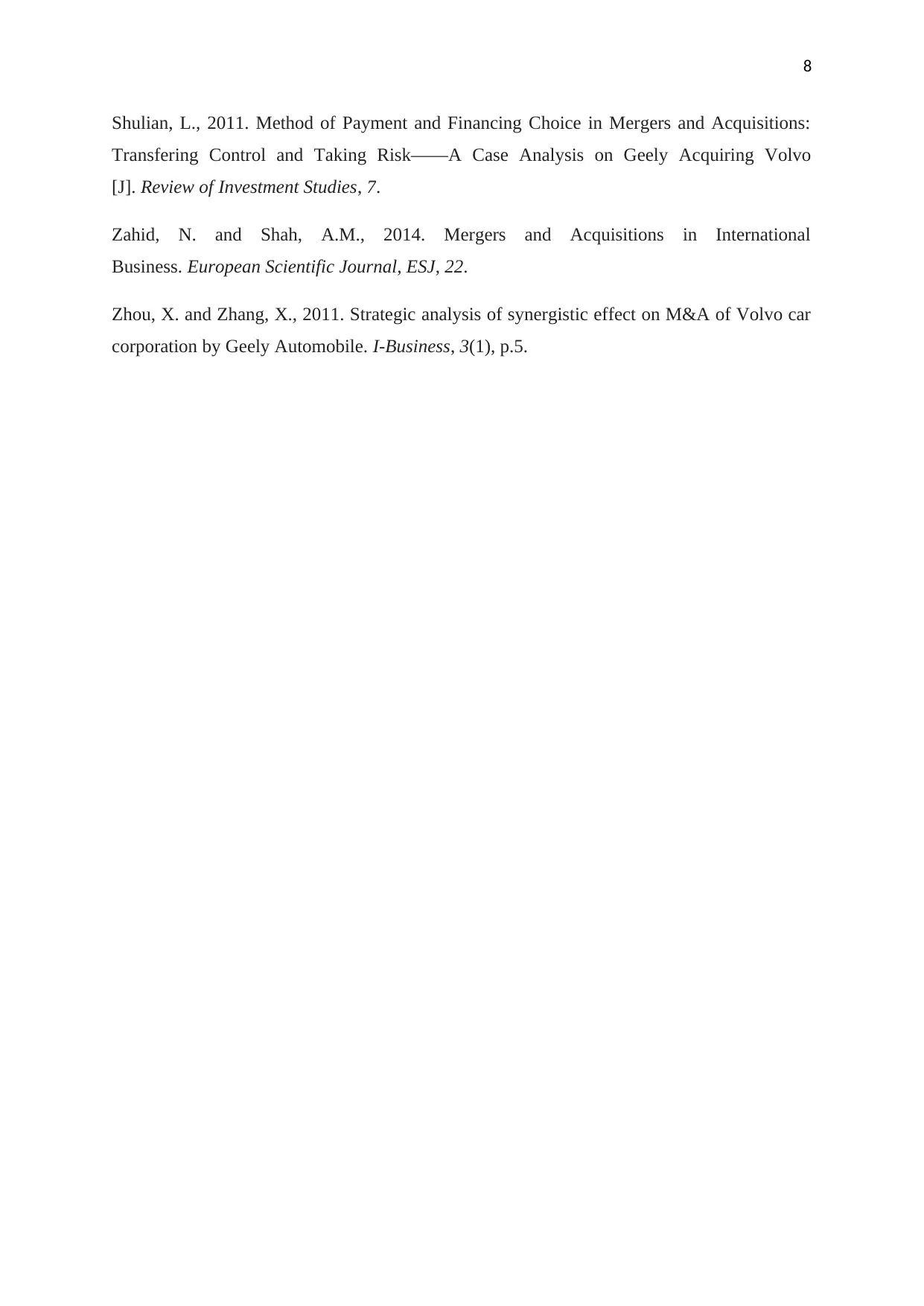
8
Shulian, L., 2011. Method of Payment and Financing Choice in Mergers and Acquisitions:
Transfering Control and Taking Risk——A Case Analysis on Geely Acquiring Volvo
[J]. Review of Investment Studies, 7.
Zahid, N. and Shah, A.M., 2014. Mergers and Acquisitions in International
Business. European Scientific Journal, ESJ, 22.
Zhou, X. and Zhang, X., 2011. Strategic analysis of synergistic effect on M&A of Volvo car
corporation by Geely Automobile. I-Business, 3(1), p.5.
Shulian, L., 2011. Method of Payment and Financing Choice in Mergers and Acquisitions:
Transfering Control and Taking Risk——A Case Analysis on Geely Acquiring Volvo
[J]. Review of Investment Studies, 7.
Zahid, N. and Shah, A.M., 2014. Mergers and Acquisitions in International
Business. European Scientific Journal, ESJ, 22.
Zhou, X. and Zhang, X., 2011. Strategic analysis of synergistic effect on M&A of Volvo car
corporation by Geely Automobile. I-Business, 3(1), p.5.
⊘ This is a preview!⊘
Do you want full access?
Subscribe today to unlock all pages.

Trusted by 1+ million students worldwide
1 out of 9
Related Documents
Your All-in-One AI-Powered Toolkit for Academic Success.
+13062052269
info@desklib.com
Available 24*7 on WhatsApp / Email
![[object Object]](/_next/static/media/star-bottom.7253800d.svg)
Unlock your academic potential
Copyright © 2020–2026 A2Z Services. All Rights Reserved. Developed and managed by ZUCOL.





